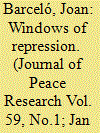| Srl | Item |
| 1 |
ID:
193686


|
|
|
|
|
| Summary/Abstract |
Violence leaves significant social groups at a long-term disadvantage, including for generating income and accessing public services. In this article, we conduct a nationwide field experiment with local authorities in Colombia to evaluate how politicians respond to conflict victims in providing access to social services. We find that local officials are more likely to respond to requests for help from victims than from ordinary citizens and return friendlier and more helpful responses. Although politicians invest additional efforts to respond to conflict victims, we show that their responsiveness, affect, and helpfulness vary based on the ideological match between the party in power and the identity of the perpetrator of violence. Using interviews, we present evidence that elected officials respond to victims to signal their commitment to peace and to separate themselves from violent groups on their ideological side. These findings provide new insights into the dynamics of political representation in postconflict societies.
|
|
|
|
|
|
|
|
|
|
|
|
|
|
|
|
| 2 |
ID:
184192


|
|
|
|
|
| Summary/Abstract |
What explains the great variation in the adoption, timing, and duration of government policies made in response to the COVID-19 pandemic? In this article, we explore whether government incentives to repress domestic dissidents influence their responses to the COVID-19 pandemic. We argue that COVID-19 containment policies are observationally equivalent to those that abusive governments use to limit domestic dissent – that is, policies that restrict citizens’ freedom of movement. This creates an opportunity for abusive governments to engage in repressive behavior without countervailing pressure from citizens and the international community. Following this logic, we expect abusive governments to be more likely to adopt restrictive policies, adopt them earlier in the course of the pandemic, and take longer to relax restrictions. Empirically, we find that governments that have recently engaged in state violence against civilians or abused citizens’ human rights were about 10% more likely to enact lockdown and curfew policies. Compared to less repressive countries, these policies were implemented approximately 48 days earlier in the pandemic and kept in place for approximately 23 days longer. Overall, our results advance our understanding of how the repressiveness of state institutions can shape policy responses to a global health crisis.
|
|
|
|
|
|
|
|
|
|
|
|
|
|
|
|